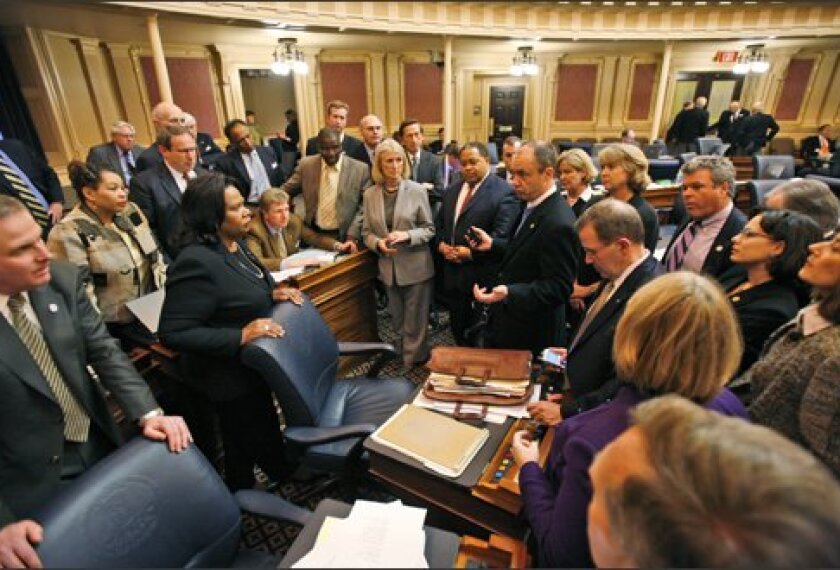The following offers highlights of the recent legislative session. Precollegiate enrollment figures are based on fall 2007 data reported by state officials for public elementary and secondary schools. The figures for precollegiate education spending do not include federal flow-through funds, unless noted.
VIRGINIA
The Virginia legislature has approved a bill that would direct the state board of education to decide whether to withdraw from participation in the federal No Child Left Behind Act. But neither Gov. Tim Kaine, a Democrat, nor the board is likely to approve such a move, according to officials in the state.
Gordon Hickey, a spokesman for Mr. Kaine, said the governor—who had yet to sign the bill as of last week—doesn’t support withdrawing Virginia from the No Child Left Behind Act, which would put much of the state’s federal education funding at risk.

|
|---|
| Democrat |
| Senate: 21 Democrats 19 Republicans |
| House: 45 Democrats 53 Republicans |
| Enrollment: 1.2 million |
Under President Bush’s proposal for the fiscal 2009 K-12 federal education budget, Virginia is set to receive $416 million in federal education funding, according to data released by the U.S. Department of Education.
Gov. Kaine is “not going to throw that away,” Mr. Hickey said. He noted that the bill says simply that the board should study the issue, and the governor doesn’t have any problem with such a study, so he’ll likely support the bill.
The legislature’s action in its recently concluded annual session “reflects the frustration that’s been felt at the state and school district level in implementing this important legislation,” said Charles B. Pyle, the director of communications for the Virginia Department of Education.
He added, however, that “the board has never taken the position that Virginia should withdraw from No Child Left Behind.” The 6-year-old revision of the Elementary and Secondary Education Act requires that schools show annual progress toward student proficiency or face a range of possible penalties.
The Virginia legislature approved and sent to the governor on March 8 a bill that said that if the board of education should decide that withdrawal were the best option, it should submit a plan for how to do so to the governor and the legislature by June 2009.
Virginia officials have sought additional flexibility from the federal Department of Education on some NCLB issues in the past but have been rebuffed. For example, the state board had requested more flexibility in determining the order in which school districts offer certain educational options—tutoring or school choice, for example—when those districts are found to need improvement under the federal law. The federal government permitted the state to carry out that plan only as a pilot program, not statewide, according to Mr. Pyle.
Mr. Pyle also noted that some state educators are unhappy with how the federal government required Virginia to stop allowing some English-language learners to take the state’s English-language-proficiency test as a substitute for its regular reading test.
“That was a source of great frustration for Virginia school districts to have the rug pulled out from under them after administering a test for several years [to ELLs] in good faith.”
In addition to passing the NCLB-related bill, the legislature approved a bill to expand the governor’s preschool initiative that serves children who are eligible for free and reduced-price lunches. Gov. Kaine scaled back his own request for preschool funds to $43 million, from $58 million, after he realized he wouldn’t get what he had initially requested. In the end, the legislature decided to provide $22 million, according to Mr. Hickey.
The legislature also adopted a bill that would require clerks of courts in Virginia to report to the state school board and the local school board if any teachers have been convicted of sexual molestation or physical or sexual abuse or rape of a child or any felony involving drugs.
Virginia’s current K-12 budget is $6.9 billion out of the state’s $36 billion budget. As of presstime last week, legislators were still hashing out what the state budget, and K-12 budget, would be for the coming fiscal year.







